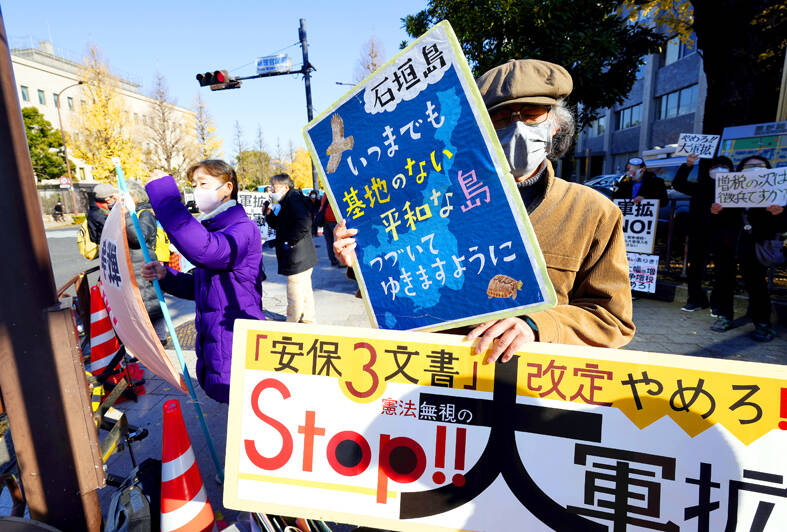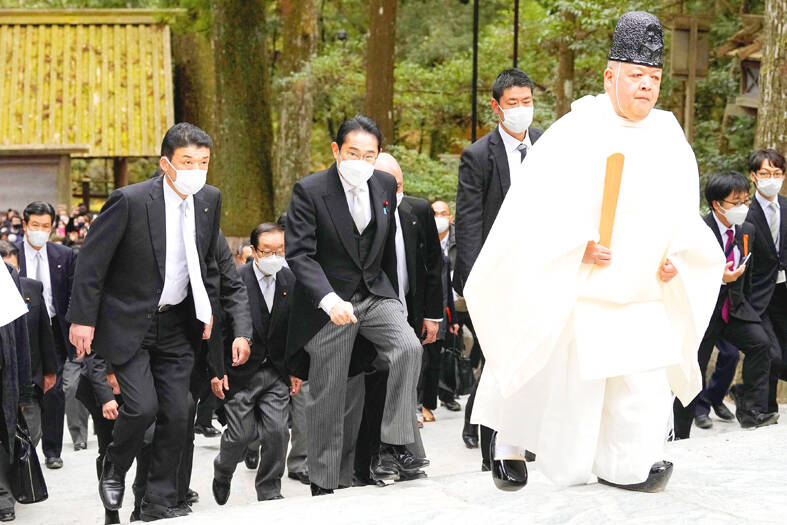East Asia could be the next Ukraine, Japanese Prime Minister Fumio Kishida said on Saturday, adding that he had conveyed this message to Western leaders in recent talks, urging them to join a united front on a rising China and bellicose North Korea.
At the start of Japan’s year-long G7 presidency, Kishida visited leaders of all members of the elite club except Germany, where he plans to go soon.
Closing his trip in Washington, Kishida said he shared with G7 leaders his “strong sense of crisis regarding the security environment in East Asia.”

Photo: EPA-EFE
“Ukraine may be the East Asia of tomorrow,” Kishida told a news conference a day after meeting US President Joe Biden, calling security concerns in Europe and East Asia “inseparable.”
“The situation around Japan is becoming increasingly severe with attempts to unilaterally change the status quo by force in the East China Sea and South China Sea, and the activation of North Korea’s nuclear and missile activities,” he said.
Kishida was referring to China’s growing assertiveness in the two areas, where Beijing has a slew of island disputes including with Japan, the Philippines and Vietnam.

Photo: REUTERS / Kyodo
China in August also fired missiles into Japan’s exclusive economic zone when it conducted major military exercises around Taiwan.
Kishida traveled to Washington after his administration announced that Japan would double its defense spending over the next five years, a sea change for a country that has been officially pacifist since its defeat in World War II.
Kishida said he would work to “explain thoroughly to the public” the need to use tax money to ramp up defense spending to 2 percent of GDP — a goal separately set by NATO that more countries are accepting since Russia’s invasion of Ukraine.
Among other steps taken under a new defense strategy, Japan would develop “counterstrike” capacity to hit threatening launch sites and hopes to buy hundreds of Tomahawk cruise missiles, now only in the arsenals of the US and the UK.
Kishida said he spoke with the British and Italian prime ministers about moving a three-way development of a next-generation fighter jet that uses artificial intelligence.
Kishida said Japan has not yet decided whether to join the US on one measure that has especially irritated China — cutting it off from imports of semiconductors critical for advanced technology.
“Semiconductors are part of economic security including for the United States and like-minded countries. We want to have closer communication to think about how to treat this issue,” Kishida said.
Japan is proud to be the only Asian member of the G7, and Kishida has said that his administration’s response on Ukraine effectively internationalized Western-led opposition to Russia’s invasion.
In turn, Kishida earlier said in Washington that Japan needs to be able to rely on “allies and like-minded countries” on risks from China.
“China needs to make a strategic decision that it will abide by the established international rules and that it cannot and will not change the international order in ways that are contrary to these rules,” he said on Friday at Johns Hopkins University’s School of Advanced International Studies.
Kishida said that Japan still sees itself as a “peace-loving” nation and would use the G7 to push for the eventual abolition of nuclear weapons.
The leaders of the G7 — Britain, Canada, France, Germany, Italy, Japan and the US — are to hold a summit in May in Hiroshima, Japan, the site of the world’s first nuclear attack and Kishida’s parliamentary constituency.

MAKING WAVES: China’s maritime militia could become a nontraditional threat in war, clogging up shipping lanes to prevent US or Japanese intervention, a report said About 1,900 Chinese ships flying flags of convenience and fishing vessels that participated in China’s military exercises around Taiwan last month and in January last year have been listed for monitoring, Coast Guard Administration (CGA) Deputy Director-General Hsieh Ching-chin (謝慶欽) said yesterday. Following amendments to the Commercial Port Act (商港法) and the Law of Ships (船舶法) last month, the CGA can designate possible berthing areas or deny ports of call for vessels suspected of loitering around areas where undersea cables can be accessed, Oceans Affairs Council Minister Kuan Bi-ling (管碧玲) said. The list of suspected ships, originally 300, had risen to about

DAREDEVIL: Honnold said it had always been a dream of his to climb Taipei 101, while a Netflix producer said the skyscraper was ‘a real icon of this country’ US climber Alex Honnold yesterday took on Taiwan’s tallest building, becoming the first person to scale Taipei 101 without a rope, harness or safety net. Hundreds of spectators gathered at the base of the 101-story skyscraper to watch Honnold, 40, embark on his daredevil feat, which was also broadcast live on Netflix. Dressed in a red T-shirt and yellow custom-made climbing shoes, Honnold swiftly moved up the southeast face of the glass and steel building. At one point, he stepped onto a platform midway up to wave down at fans and onlookers who were taking photos. People watching from inside

Japan’s strategic alliance with the US would collapse if Tokyo were to turn away from a conflict in Taiwan, Japanese Prime Minister Sanae Takaichi said yesterday, but distanced herself from previous comments that suggested a possible military response in such an event. Takaichi expressed her latest views on a nationally broadcast TV program late on Monday, where an opposition party leader criticized her for igniting tensions with China with the earlier remarks. Ties between Japan and China have sunk to the worst level in years after Takaichi said in November that a hypothetical Chinese attack on Taiwan could bring about a Japanese

The WHO ignored early COVID-19 warnings from Taiwan, US Deputy Secretary of Health and Human Services Jim O’Neill said on Friday, as part of justification for Washington withdrawing from the global health body. US Secretary of State Marco Rubio on Thursday said that the US was pulling out of the UN agency, as it failed to fulfill its responsibilities during the COVID-19 pandemic. The WHO “ignored early COVID warnings from Taiwan in 2019 by pretending Taiwan did not exist, O’Neill wrote on X on Friday, Taiwan time. “It ignored rigorous science and promoted lockdowns.” The US will “continue international coordination on infectious